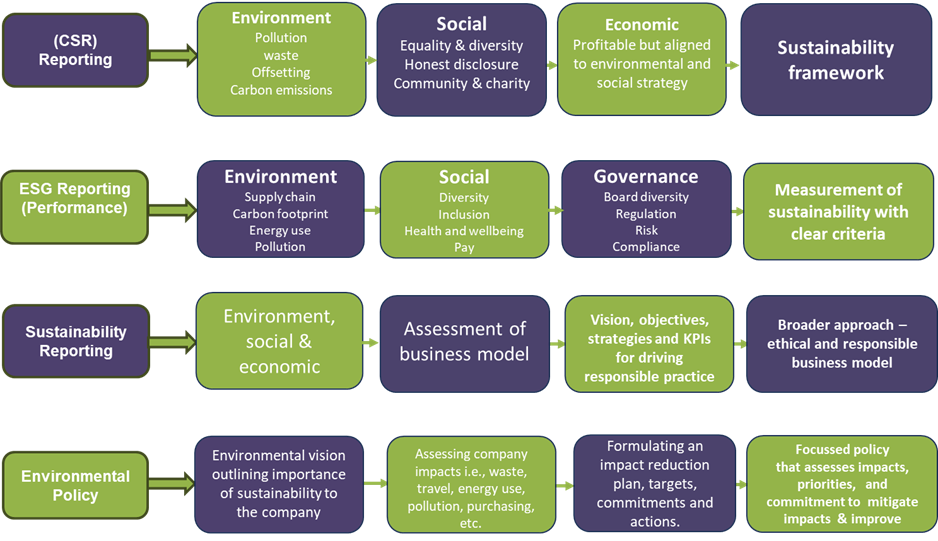Environmental and sustainability considerations are fast becoming a critical component of business for SMEs. Reporting on these issues is thought to be a key driver for business success, offering a genuine competitive advantage to those who choose to implement sustainability into their core business operations. Implementing sustainability reporting mechanisms is an important factor for driving business growth and ensuring longevity. Reporting provides a channel of communication for companies to outline their environmental, social and economic performance to key stakeholders. It can help with cost savings, economic performance, increase stakeholder engagement, attract and retain customers and demonstrate the company’s commitment to sustainability and the environment. This ultimately improves reputation and facilitates a transparent and fair reporting process. However with so many different types of reporting such as ESG, CSR, environmental reporting, sustainability reporting, carbon reporting and Triple Bottom Line reporting (TBL) (to name a few), it can be an overwhelming process to decipher which type of reporting is right for your business and what the key benefits to implementing these reporting strategies are, particularly for non-mandatory reporting.
In this blog, we will look at CSR reporting, ESG reporting and the development of Environmental policy. These types of reporting method are the most widely used and can be applied in wider sustainability reporting and to a range of different businesses. Choosing the correct method for your business can be critical for utilising the reporting tools effectively.
Corporate Social Responsibility (CSR) reporting
CSR reporting is a useful framework outlining three key reporting features, environmental, social and economic. This type of reporting allows companies to assess environmental performance covering aspects such as pollution, waste, resource use, emissions etc., but also requires companies to address the impact that they have on society from a philanthropic perspective. It enables businesses to disclose organisational equality and diversity procedures and community and charitable impacts. These are considered to be equally as important as both environmental and economic practices. Monitoring and reporting environmental and social practices can help companies to identify areas for improvement. This is done via an appropriate monitoring process and can also help the company to set achievable sustainability goals, measuring any progress made towards them. This can improve reputation, increase competitive advantage and facilitate cost savings, particularly for areas such as resource use. Disclosing this information enables stakeholders to make informed decisions. CSR reporting is self-regulating, therefore the company must be accountable to itself and shareholders when providing information on sustainability and social outputs. This method is usually used in larger organisations however is applicable to SMEs who want to implement a structured framework for reporting.
Environmental Social and Governance Reporting (ESG)
ESG reporting is considered to be the ‘next step’ after CSR. It covers environmental responsibilities such as carbon footprinting, supply chain analysis, energy use, pollution etc. It also addresses social impacts (diversity, inclusion, health and wellbeing, pay etc.) and governance (board diversity, regulation, risk and compliance). This method provides a measurement tool with clear sustainability criteria to judge business performance. One of the key benefits of using this reporting method is that it is highly applicable to all businesses regardless of size, and is becoming more desirable to investors. This method facilitates a transparent approach regarding environmental, social and governance risks that an organisation might face, and in addition, makes reporting more transparent due to the set of criteria used. ESG is a multifaceted approach to reporting and provides opportunities for a competitive advantage, similarly to other environmental reporting practices. It is appealing to investors, facilitates a long term growth plan, improves operational efficiency i.e. through improved resource use and waste reduction, and mitigates risk via supply chain assessments (i.e., careful selection of suppliers with similar sustainability credentials). In view of this, ESG reporting is becoming highly valuable to larger companies, and so therefore applicable to smaller companies who want to meet sustainability criteria that will enable them to work with larger organisations.
Environmental policy
Smaller companies may opt for a singular environmental policy that outlines the company’s commitment to environmental and sustainability issues. Or they may have an environmental policy that acts as an additional output for their reporting alongside a CSR/Sustainability/ ESG report. This is often the case with larger businesses. An environmental policy sets out the environmental responsibilities of a business alongside improvements that can be measured to ensure that environmental and sustainability goals are met. Types of environmental outputs that could be included in a policy are reducing waste, measuring / reducing carbon emissions, resource efficiency, biodiversity reporting, complying with legislation, and training staff to encourage an environmentally aware workforce. It is essential that the policy and goals are relevant to your orgainsation and the sector that it sits within. Having a clear environmental policy can significantly increase competitive advantage as it can facilitate the move towards being a preferred supplier, particularly with organisations who have strong environmental credentials themselves. One of the biggest benefits of a policy over other types of reporting, particularly for SMEs is that a policy is much shorter than an ESG/ CSR report but can still be highly effective with the correct reporting and messaging tools.
There are a number of reporting methods that cover a range of different environmental and social outputs. Having a robust reporting approach can be highly advantageous for SMEs, particularly as sustainability reporting becomes more important for supplier selection, and working relationships with those who have stringent reporting mechanisms in place. Currently there is no right or wrong answer for reporting, but getting the basics in place will ease any future transition into mandatory discloser for smaller organisations. When deciding on the right approach, the most important questions to consider are: what is right for the business; what are your key values; what goals are achievable, what resources can you contribute to the policy / strategy, and; what will set you apart from the competition.
Figure 1. Sustainability reporting overview

Credibly Green provide technical advice to clients on all things carbon and sustainability. See www.crediblygreen.com or call 01746 552423 or email support@crediblygreen.com




